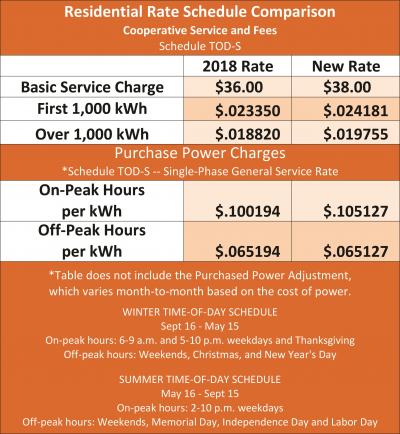
The North Central Electric Board of Trustees revised the cooperative’s rate schedules at its October meeting, approving a $2 per month increase in the basic service charge for residential members.
Additionally, the rate spread between on-peak and off-peak rates on this rate schedule will increase by one-half cent per kilowatt-hour (kWh).
Both adjustments will be effective Jan. 1 and will be reflected on members’ February electric bills.
The difference between on-peak and off-peak electric generation charges will increase from 3.5 to 4 cents
per kWh.
“The actual cost spread between on-peak and off-peak hours is between 3.5 to 4 cents per kWh,” NCE General Manager Markus Bryant said. “We have finally reached this target and should be able to maintain that 4-cent difference for a while as our power supplier, Buckeye Power, has forecast their rates to remain stable for some time. This, however, could change if regulatory changes negatively affect power costs.”
To reach this target, the cooperative has gradually increased the spread annually by one-half cent per kWh. This will mark the sixth consecutive year the spread between on-peak and off-peak kWh charges increased by one-half cent.
This change in the difference between on-peak and off-peak generation charges is not a rate increase. When the rate difference is altered, the on-peak rate increases while the off-peak rate decreases proportionately.
This change in the time-of-day rate better reflects the cost of power purchased from Buckeye Power, NCE’s wholesale power supplier. On-peak hours refers to times when electricity demand is the highest and therefore more expensive. Off-peak hours occurs during periods of lower consumption, which is less expensive.
“The time-of-day rate allows members to save some money on their electric bill by voluntarily shifting the time they run their appliances, such as a dishwasher, clothes washer, or dryer, to off-peak hours,” Bryant said.
Basic service charge
The basic service charge will increase from $36 to $38. This fee has been adjusted annually the past 10 years. To avoid “rate shock,” the board opted to raise the monthly service gradually each year in $2 increments, rather than moving directly to the full cost of having a service in place.
Members pay the basic service charge regardless of how much electricity is used each month. It offsets some of the fixed costs of providing electric service, such as the cost of poles, wires, transformers, and other necessary equipment. The increase in the monthly service charge allows the cooperative to keep pace with the cost of ongoing maintenance and replacements to its 1,793 miles of distribution lines.
“Every year, we conduct a cost-of-service study to ensure these costs will be covered, allowing us to continue providing safe, reliable power at an affordable rate,” Bryant said.
North Central spends an average of $2 million annually replacing aging power lines and other electricity distribution equipment. “Preventive maintenance is the cheapest and best form of maintenance,” Bryant said. “We believe our members value system reliability.”
